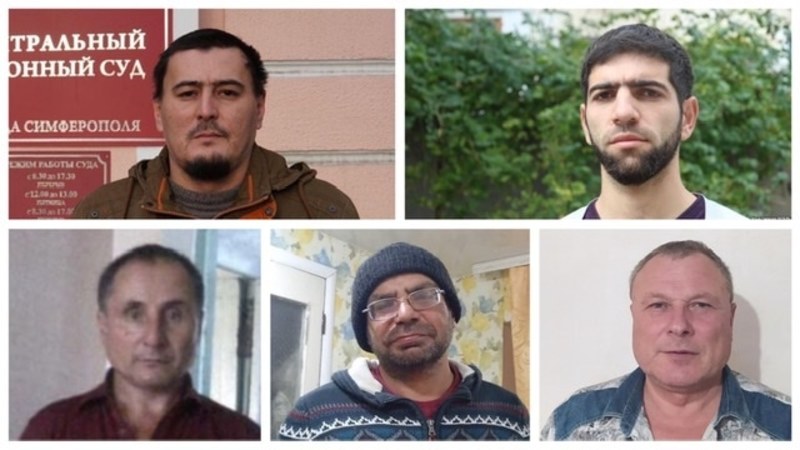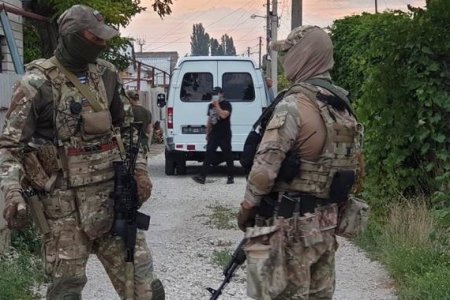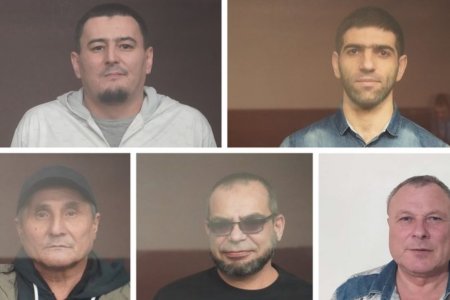
Crimean Solidarity has spoken with Safiye Shabanova, one of the lawyers who took part, by video link from occupied Crimea, in the hearing on 20 October. She explained that the supposed ‘witness’, referred to by the pseudonym ‘Gafarov’, had asserted that civic activist Enver Krosh “was planning a coup and change of regime.” While purportedly ‘remembering’ this, he was quite unable to explain how, exactly, Krosh was planning to do this. Nor could he provide anything but the vaguest of answers to basic questions about the defendants’ family circumstances, their place of work, etc. Like all other ‘secret witnesses’ used in such trials, he claimed this was due to having a poor memory”.
The ‘secret witness’ also asserted that journalist Villen Temerianov had “always taken part in the discussions” and had virtually never missed any of them. Temerianov pointed out that this was demonstrably false as, over the past three years, he had regularly left occupied Crimea to obtain treatment for his ill child, as well as carrying out his journalist work (which involved visiting political trials in Rostov (Russia).
A second ‘secret witness’ is to be questioned at the next hearing before the Southern District Military Court in Rostov. The ‘judges’ from this court have become notorious for their part in allowing evidently flawed ‘evidence’ and blocking attempts by the defence to prove that it is false. No proof is ever demanded that the ‘secret witnesses’ have anything to fear from the defendants or their families if they testify openly, and the ‘judges’ often refuse to allow questions which will prove that the ‘witnesses’ are lying. It should be stressed that these alleged ‘witnesses’ often provide the only ‘evidence’ that backs the charges against the defendants. The court has even ignored clear evidence that a ‘secret witness’ changed his ‘testimony’ to match the altered indictment against political prisoner Raim Aivazov. Russia’s use of anonymous ‘witnesses’ has been condemned by the UN Secretary General and is in further breach of a binding European Court of Human Rights judgement from 2020.
Aside from ‘secret witnesses’, the only other ‘evidence’ claimed to warrant ‘terrorism’ charges and sentences of up to 20 years’ imprisonment is an illicit tape of a conversation on religious subjects and about Russia’s persecution of Muslims at a mosque, eight years ago, in 2015. Since it was the FSB who organized such illicit recordings, the fact that they did nothing for eight years indicates just how flawed and politically motivated the charges are.
In this case, the timing of the men’s arrests was almost certainly also political Six Crimean Tatars from Dzhankoy and the surrounding region were arrested on 11 August 2022, shortly after huge explosions at the Saki air base destroyed seven Russian military planes and damaged others. Russia’s FSB and state-controlled media claimed that the armed raids and arrests of Crimean Solidarity civic journalist Vilen Temerianov (b. 1985) Seitiaha Abbozov (b. 1957); Rinat Aliev (b. 1964); Edem Bekirov (b. 1976); Enver Krosh (b. 1991); and the youngest of the men, Murat Mustafayev (27 at the time) had “eliminated a terrorist cell controlled from Ukraine”.
It is possible that it was only the timing that linked this with Russia’s full-scale war against Ukraine, since in all other aspects this was the latest of very many other arrests and trials on profoundly flawed charges. Russia’s FSB began arresting Crimean Tatars and, very occasionally, other Ukrainian Muslims, back in 2015 and have, since 2017 been using them as a weapon to try to crush Crimean Solidarity and against Crimean Tatars in general. There is also a mercenary motive since the FSB are known to get bonuses or promotion for such prosecutions which require virtually no work and are virtually guaranteed ‘good statistics’, convictions and rejected appeals. A flawed, and almost certainly politically motivated, Russian Supreme Court ruling from 2003 declaring the peaceful transnational Muslim organization Hizb ut-Tahrir ‘terrorist’ is used to sentence men who are not accused of any actual crime to terms of imprisonment up to 25 years. In violation of international law, Russia has been using this as an excuse for arresting Crimean Tatars, especially civic journalists and activists, since 2015. The situation is especially shocking given that Hizb ut-Tahrir is legal in Ukraine (and most other countries). The FSB invariably designates at least one person as ‘organizer’ of a supposed Hizb ut-Tahrir group under Article 205.5 § 1 of Russia’s criminal code. The others are accused of ‘involvement’ in such a fictitious ‘group’ (Article 205.5 § 2). In occupied Crimea, Russia also adds an extra, preposterous, charge of ‘planning to violently seize power’, under Article 278. Enver Krosh is accused of being the ‘organizer’, with the sentences currently handed down ranging from 17 to 20 years. . Seitiaha Abbozov; Rinat Aliev; Edem Bekirov and Vilen Temerianov are charged with ‘involvement’, and face sentences of from 12 to 16 years. All of these sentences are in the worst of Russia’s penal institutions
In April 2023, it was learned that Murat Mustafayev had been sentenced to four years’ imprisonment for supposed involvement in Hizb ut-Tahrir. This was the fastest ‘trial’ to date, and shortest sentence against a Ukrainian citizen on these charges, with it, unfortunately, likely that Mustafayev was forced to do more than merely ‘admit guilt’ (details here). Seitiaha Abbozov was, at least, placed under house arrest, however the other four men were first imprisoned in occupied Crimea, and now in a SIZO [remand prison] in Rostov, where the ‘trial’ began back in June this year.



